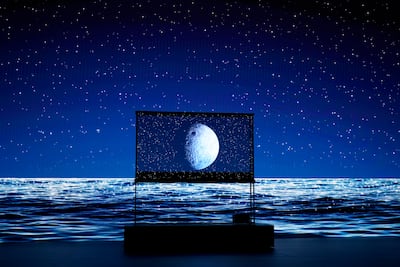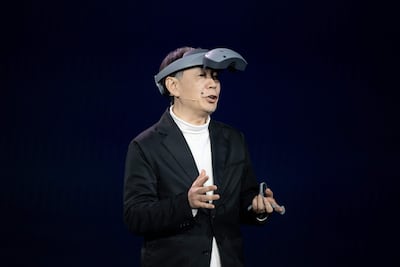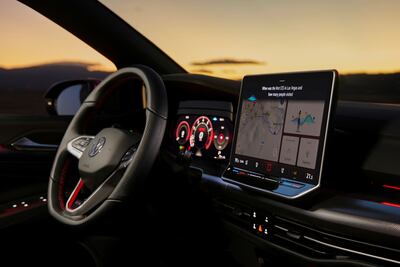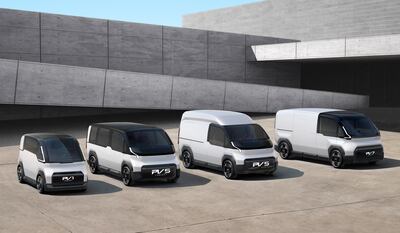CES, the world's biggest technology exhibition, is in full swing and, once again, it has failed to disappoint.
The Las Vegas showpiece has a number of big companies and up-and-coming ones showcasing their latest products aimed at shaping the future.
The event, formerly known as the Consumer Electronics Show, has become a platform for major announcements, innovations and, at times, the unveiling of some of the tech industry's weird and wonderful stuff.
We take a look at some of the highlights so far from CES 2024, and we are sure there is something that will pique your interest.
LG's transparent TV
South Korea's LG Electronics, one of the world's biggest appliance manufacturers, unveiled what it called the world's first transparent OLED television, the LG Signature OLED T.

How does it work? The TV's Zero Connect Box wirelessly transmits 4K images and sound to the OLED T. The TV also doubles as a piece of furniture that blends in with its environment thanks to its transparency, or as some sort of digital aquarium.
This isn't the first time LG has introduced a unique TV. In 2021, it rolled out – pun definitely intended – the Signature OLED R, which has a rollable display and is priced at a whopping $100,000. LG has yet to announce the Signature OLED T's availability and price – which we're quite sure is also “up” there.
Samsung brings back Ballie
Samsung is further leaning into the artificial intelligence game with a revamped version of its Ballie robot. The rolling machine, which resembles a tennis ball and was first introduced at CES 2020, can now act as a projector while following you around.
Aside from communicating with it and issuing commands, Ballie can interact with other smart home devices and, apparently, check on your pet and even “feed” it.
On the hardware side, Samsung announced new visual display products and digital appliances, the Galaxy Book4 laptop and the new Spatial AI service to boost interaction between users and its devices – all underpinned by, you guessed it, AI.
Samsung, the world's biggest mobile phone manufacturer, is scheduled to introduce its next flagship smartphone line-up on January 17 in San Francisco, expected to be the Galaxy S24 series, with more AI on the tab.
In addition, the Seoul-based company gave a sneak peek of new concept displays that are bigger, rollable and more foldable, describing the last one as In&Out Flip, because it “can be folded inward and outward”.
Samsung is expected to unveil these new-generation displays on Tuesday at CES.
Sony to give 'birth certificates' to images
Japan's Sony capped off the first day of CES by committing to fight off misinformation – by giving “birth certificates” to images shot on their cameras.
The Tokyo-based company said it has developed in-camera digital technology that would verify the authenticity of an image, which very much resembles the concept of non-fungible tokens.
The initiative, in collaboration with the Associated Press and “other industry leaders to create a digital birth certificate for images shot on our cameras, … will validate the origin of their content and help safeguard facts and combat misinformation”, Neal Manowitz, president and chief operating officer of Sony Electronics, said at CES.
Other highlights of Sony's presentation include boosting the creator community by introducing new services, from creating digital scenes ahead of principal photography to supporting the growth of virtual production, and a new fan engagement experience in collaboration with English football team Manchester City.
The company is also taking aim at Meta Platforms and Apple in the high-tech headset game with the introduction of a new mixed-reality headset in co-operation with Germany's Siemens.

The device, expected to be available later this year, allows for spatial content creation and can be controlled with ring and stylus-like accessories – which have not been developed by even the Facebook parent company or iPhone maker.
And, just for fun, Sony drove the latest version of the Afeela electric car, made by the Sony Honda Mobility joint venture, on stage – using a PlayStation controller.
Volkswagen and ChatGPT ride together
Volkswagen, Europe's biggest car maker, has joined the generative AI race by integrating a ChatGPT-powered bot into a number of its vehicles.
The chatbot will be integrated into its IDA digital assistant, and “offers a multitude of new capabilities that go far beyond the previous voice control”, the Wolfsburg-based company said.

That includes controlling the infotainment system, navigation and air conditioning, or answering general knowledge questions.
“In the future, AI will provide additional information in response to questions that go beyond this as part of its continuously expanding capabilities,” it added.
However, as noted by TechCrunch, the chatbot “could still be tricked in some cases”. It will initially be introduced in Europe, with a US launch “being considered”.
The chatbot will be available on the ID.703, ID.4, ID.5 and ID.3, ID.4, ID.5 and ID.703 electric car models, and the new versions of the Golf04, Passat and Tiguan.
Kia's modular vehicles let you swap parts
Need more space in your vehicle? Kia will let you do just that but instead of swapping the actual vehicle, you can instead swap out its parts.

The Korean car maker announced new modular vehicles that let users customise them according to their needs.
This is part of Kia's Platform Beyond Vehicle (PBV) future mobility strategy, which includes five modular vehicles that are set to enter mass production in 2025.
“Behind a fixed cab, or ‘driver zone’, a variety of interchangeable upper bodies, or ‘life modules’, can be connected to the base vehicle via a hybrid electromagnetic and mechanical coupling technology, turning the PBV into a taxi during the day, a delivery van at night and a personal recreational vehicle on weekends,” it said.
Android in 'pairs'
Google announced a number of new updates for its Android mobile operating system, centred on seamless connection between devices.

The Alphabet-owned company introduced Quick Share, which, as its name implies, will allow users to connect and share to other Android and Chromebook devices – drawing parallels to Apple's AirDrop.
Quick Share is actually a Samsung concept. However, the two companies collaborated to merge it into a “singular cross-Android solution”.
Google also said Android Auto would be integrated into more cars, particularly electric vehicles, in the coming months, with Ford's Mustang Mach-E and F-150 Lightning going first.
It also introduced Fast Pair, which allows you to connect Bluetooth devices such as headphones to Android devices much quicker, as well as updates to casting, including directly sending TikTok content to Chromecast.
Casting on Amazon
Speaking of casting, Amazon announced Matter Casting, which lets users cast content to its Fire TV and Echo Show 15 devices directly from supported streaming apps on Android and Apple's iOS.

The world's biggest e-commerce company said it has been “a long-time supporter of using open technology standards to give customers more choice over the devices and services they use in their homes”.
Aside from that, Amazon said that its Alexa digital voice assistant would be getting new generative AI-powered tools from developers.
Meanwhile, Amazon's mobility unit Zoox showed off the latest generation of its purpose-built vehicle.
The California-based company, which Amazon acquired in 2020 for a reported $1.2 billion, also gave CES attendees an exclusive opportunity to join its wait-list and be among the first to sign up for its self-driving, ride-hailing service.
Wow, what a gesture
Apple made watch gestures popular, letting you control your digital timepiece with your fingers and wrist. Now, there is a new challenger on the block.
Doublepoint Technologies, a touch interface company based in Helsinki, unveiled its Wow Mouse app, which allows users to perform gestures to control Android-powered smartwatches.
You can perform gestures such as double-tapping, pinching and holding – as you would do with a mouse, trackpad or on your device's screen – to perform the actions you wish.
The app is now available on Google Play and can control almost anything with Bluetooth, from smartphones to computers and headsets to smart lights.

